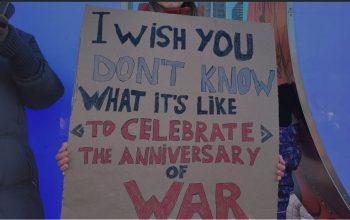Why universities can and must stop the spread of mainstream hate speech
Aaron Panciera EDITOR-IN-CHIEF
Photo: The Daily Dot
Higher education is facing a free-speech crisis. Since the Vietnam War era, when students at universities such as the University of California, Berkeley (UC Berkeley) championed their right to speak their minds, the freedom we have known to be our birthright has transformed into something our grandparents could have never fathomed. It has led to the rise of public intellectuals such as Ben Shapiro, Richard Spencer, and, to a certain degree, David Duke. We are now living in the era of free speech versus hate speech.
Perhaps the most prominent purveyor of hate speech on campus in 2018 is Milo Yiannopoulos, former Senior Editor at the alt-right publication Breitbart and self-proclaimed “most fabulous supervillain on the internet.” In the fall of 2017, Yiannopoulos was to headline an event known as “Free Speech Week” on the UC Berkeley campus, organized by right-wing campus publication the Berkeley Patriot. While this event was canceled due to poor organization on behalf of the Berkeley Patriot and a lack of commitment from key speakers such as Steve Bannon and Ann Coulter, this was not Yiannopoulos’ only endeavour to fight free speech, or more specifically, to use freedom of speech as a tool to incite violence against those who disagree with him.
Yiannopoulos’ most lasting impact, however, lies not in his commitment to the intellectual movement against the suppression of free speech but instead in his role in the Capital Gazette shooting in Annapolis, Maryland, on June 28, 2018. While he himself played no direct role in the shooting, his brand had an undeniably visible impact on the psyche of the assailant. Two days before the shooting, he spoke to a journalist at The New York Observer, saying, “I can’t wait for the vigilante squads to start gunning journalists down on sight.” He then doubled down on his call to murder journalists, telling Mediaite, “If journalists keep lying, deceiving, and manipulating the public, then they will reap the same hatred they are sowing against [President Donald] Trump and his voters. Truthfully I take no pleasure in the prospect: I’d rather beat you in a debate hall than a wrestling ring. But you did this to yourselves, and you deserve what’s coming.”
Hate speech is not a new phenomenon in Western civilization. Joseph McCarthy used this tactic to gain political favour during the Red Scare, and the Klu Klux Klan (KKK) has been practicing hate speech for over a century now. David Duke, the infamous KKK Grand Wizard, was so popular that he won a seat on the Louisiana State House of Representatives. However, Western liberal democracy has never seen a hate speech movement with anywhere near the national support such as is the case today in the Trump era. Donald Trump has proven that hate speech can be utilized by even the most incompetent and underqualified of men as a leverage to uncompromising power. Internet personalities such as Yiannopoulos, Coulter, and now Jordan Peterson, have ridden this wave of hate speech popularized and perfected by Trump to newfound celebrity. While none of these individuals are President of the United States, power lies in one’s ability to influence a population. Yiannopoulos, Coulter, and Peterson are doing exactly that: influencing a population.
However, the line between hate speech and free speech is incredibly vague. In fact, all those who have made a living off of hate speech would argue that they are in fact protecting a fundamental North American value: free speech.
The truth is that Yiannopoulos is right — the rhetoric he drives is, at its fundamental core, free speech. Freedom of speech, according to Merriam-Webster Dictionary, is simply “the legal right to express one’s opinions freely.” This right is protected under both the Bill of Rights in the United States and the Charter of Rights and Freedoms in Canada. At its core, hate speech is free speech. This is inherently problematic, as it muddies the line between an unpopular opinion and hate speech that is detrimental to public discourse. Examples such as those from Yiannopoulos are pretty clear cases of hate speech, as he explicitly calls for violence against a group of people, in this case against “progressives,” as a means to an end. In the case of personalities such as Peterson, however, this distinction becomes significantly less clear.
If hate speech is inherently free speech, at what point does this speech necessitate censoring? Former American Supreme Court Justice Oliver Wendell Holmes Jr. established the ‘clear and present danger’ test for exactly this reason. This test essentially states that freedom of speech should be curtailed if it poses a clear and immediate danger to others. Yiannopoulos’ use of America’s First Amendment poses a clear and often immediate danger. It is also necessary to make the distinction between public and private speech. What is said in private conversation can rarely be determined as posing a clear and immediate danger. Public statements, however, are a different story. One cannot control the audience of public statements. This is especially the case since we now live in the internet era, where the primary platform of mainstream intellectual discourse is social media.
The nature of public rhetoric in the internet age gives these public figures an unprecedented platform not just for the spread of ideas, but for public feedback, support, and rejection of such ideas. Social media promotes groupthink usually reserved for incredibly unique situations. History has seen this type of groupthink before in fascist Italy and Nazi Germany following the disproportionate effects of the Great Depression on these two nations. However, these economic factors do not apply to North American society today. While economic and social anxiety are absolutely prevalent in today’s society, Canada and the United States are not ravaged by war or depression. While equality movements do disrupt the historical power dynamics of North American society — the world is being dominated by white males less and less — these conditions are gradual and do not incite the same extreme desperation as does starvation and war.
Taking all of these factors, or lack thereof, into consideration, it is logical to conclude that the onus of the rise in the popularity of hate speech is on social media. Before the invention and the exponential rise in popularity of social media sites such as Facebook, Twitter, and YouTube, the ability for one’s statement to reach millions of people within days was reserved to a select few. American Presidents and Canadian Prime Ministers held this platform, but the speeches they gave that reached these audiences were carefully crafted and proofread by writers and aides. Public statements, in essence, were reserved for those who understood the gravity of their words.
This is no longer the case. Children can now carry this platform. Shortly after winning the presidential election, Trump retweeted a post reading, “Pathetic — you have no sufficient evidence that Donald Trump did not suffer from voter fraud, shame! Bad reporter.” The account of which this was originally posted was that of a 16-year-old kid from Beverly Hills, and after Trump retweeted this, his tweet was seen by Trump’s 10s of millions of followers, as well as anyone who regularly follows the news. If Twitter gave some irrelevant high school student the platform to reach that many people, what can it do for a much more socially and politically adept adult such as Jordan Peterson?
Before Peterson became an internet personality, and, in the words of The New York Times columnist David Brooks, “the most influential public intellectual in the Western world right now,” he was known almost exclusively in the academic world as an accomplished psychologist. Then, in 2016, he became an overnight celebrity with his YouTube video concerning the lack of legitimacy regarding special gender pronouns, among other similar topics. While this video was incredibly controversial at the time, it was conventional in the sense that this was not a new argument, and YouTube at this point had become a pretty typical medium for academics to express opinions that were unrelated to their field of study. How Peterson’s internet personality evolved, however, was anything but.
Jordan Peterson’s rise to internet stardom evolved significantly after a video railing against political correctness went viral. If anything, his public ideology has become more controversial, and in turn has diminished the quality of the public discourse he intends to moderate. He has abandoned legitimate academic arguments for debating, and attacking, “weak-minded” liberals.
Some of his speech constitutes a clear and immediate danger to those he directs it toward. In October 2017, Peterson posted links to the Facebook profiles of two students who were instrumental in organizing a protest against an event at Ryerson University called “The Stifling of Free Speech on University Campuses,” at which Peterson was scheduled to speak. The event was canceled in August 2017. One of his tweets read, “One of the communists (really) who celebrated the shutdown of our Ryerson talk: studying business…” along with a link to the student’s Facebook profile. At least one of these students was the target of considerable harassment at the hands of Peterson’s “fans.”
This presented a clear and immediate danger to this student’s well-being, and Peterson is directly responsible. By branding these students as enemies of his movement, and consequently posting links to their Facebook pages, he left these students to the mercy of those that will listen to his every word, those whose anger he effectively cultivated into a movement. Actions such as these should result in legal consequences for the offending party.
However, this example of speech that clearly does not pass the ‘clear and present danger’ test is rare. What separates Peterson from peers such as Yiannopoulos is that, while what he says is clearly hateful and often derogatory, it is unclear if this presents immediate danger.
In April, Alek Minassian killed 10 people by intentionally hitting them with his van. He was part of a group calling themselves “incels,” short for “involuntary celibates,” who believe women should be viewed as sexual objects. Following this, Peterson advocated for “forced monogamy” because, as he believed, this attack could have been prevented if Minassian had a partner.
“He was angry at God because women were rejecting him,” Peterson told The New York Times. “The cure for that is enforced monogamy. That’s actually why monogamy emerges.”
This statement is clearly erroneous and untrue; the terrorist attack is not the fault of women refusing to have sex with Minassian, and women do not enter into monogamous relationships to prevent violence from men. These statements contribute to the toxic masculinity, and the belief that being born male entitles you to anything, which has eroded equality movements and women’s general right to well-being. However, this speech does not present a clear and immediate danger, and therefore passes.
But is it not still wrong? Many would argue that this discourse is incredibly dangerous to the rights of women, including the fundamental right to life and liberty. More importantly, however, is that this statement is completely devoid of fact.
Universities, historically, have been vital to understanding each citizen’s right to free speech. The onus is now on universities to make sure that ideas that stem from this speech have used factual evidence to support the argument. We cannot stifle opinions. What we can do is point out the inaccuracies in those arguments that we see as harmful to society.
However, this has already been done. Many publications, politicians, and informed citizens have attempted to use fact and reason in vain. The problem is not in the argument, but who says the argument. It is easy to dismiss publications as being “fake news,” politics as being biased, and individuals as being ignorant. However, universities foster an influence like no other entity in North American society. Universities provide some of the most groundbreaking research in every academic discipline. The public intellectuals we chastise tend to have university degrees. These individuals have been, and still are, shaped by universities in a way they are not by other people or organizations.
For too long, universities have been neutral on debates regarding free speech for fear of stifling their students’, faculty’s, and staff’s right to free speech. While it is not the university’s place to speak out on ideologies, it is the university’s place to speak out on factual inaccuracies in these arguments. When Peterson says that the lack of a girlfriend or wife in a man’s life leads to acts of violence, the university should point to reports that almost half of all murdered women are killed by their partners. When Peterson condemns and doxxes student protesters, the university needs to take a public stance that student protests are also a form of free speech.
Hate speech is difficult to define, and even more difficult to prosecute. Fact, however, holds imminent truth. The answer to this rise in hate speech is not restrictions on free speech. Dissonance should instead come from where the idea of free speech as a fundamental right was popularized. It should be pronounced from the one institution North America deems to be the purveyor of fact and truth. Universities need to condemn ignorance to fact. Universities need to condemn hate speech.




